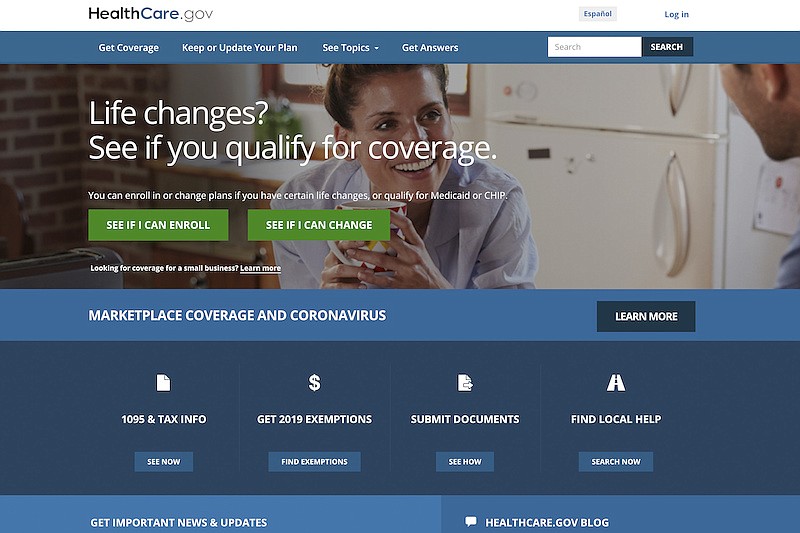Individuals who bought their health insurance through the health exchange program will soon be getting rebate checks in the mail.
BlueCross BlueShield of Tennessee is issuing refund checks averaging $890 for those with individual plans bought under the health exchange program of the Affordable Care Act. The rebates are being granted, even after BlueCross cut its health insurance rates last year because it paid health benefits less than 80% of the premiums collected on individual and small group plans offered through the health exchange marketplace under the Affordable Care Act. The rebate checks are the biggest for the Chattanooga-based BlueCross since the health exchange marketplace began under the so-called Obamacare program in 2004.
Cigna Healthcare, which is another one of the handful of health insurers that offered coverage under the health exchange marketplace in Tennessee last year, also is making refunds for about 51,000 persons it covered under the Obamacare program in 2019.
The insurance rebates are only for those covered under the health exchange marketplace and not for those consumers who receive their BlueCross BlueShield of Tennessee or Cigna insurance coverage through other means such as their employer.
The health care reform law requires insurance companies to pay annual rebates if less than 80% of the premiums they college are spent on claims and other costs that improve health care. In 2019, after all of the payments and adjustments were made, state regulators determined that BlueCross paid 69.2% of individual premiums and 79% of small employer (less than 50 employees) premiums on eligible health care services.
"This rebate system is working as intended to ensure consumers get the most value for their premium dollars," said Rachel Jrade-Rice, assistant commissioner for the Tennessee Department of Commerce and Insurance.
By the numbers
* 143,000 - Number of Tennesseans getting refunds* $890 - Average refund for individuals covered by BlueCross BlueShield of Tennessee* $540 - Average refund per person for small employer groups by BlueCross BlueShield of TennesseeSources: BlueCross BlueShield of Tennessee, Tennessee Department of Commerce and Insurance
Last year was the first time since the Marketplace plans for individuals under the Affordable Care Act were introduced in 2014 that BlueCross refunded some of what it charged its customers because it didn't pay out enough of its premium income in health care costs in 2018. Last fall, BlueCross mailed out insurance rebates totaling $21.4 million to about 100,000 individual policy holders, and another $1.2 million was mailed to small group employers.
Due to its initial aggressive pricing and unanticipated expenses and changes in the new federal program, BlueCross initially lost more than $400 million on its Obamacare coverage in the first three years. In response to such losses, BlueCross more than doubled its rates over time after the federal government cut its risk adjustment payments to insurers and eliminated the individual mandate for all persons to buy health insurance. BlueCross also limited some of its coverage areas to put the individual market back in the black in 2017 and the company reported record earnings last year.
Kelly Paulk, vice president of product strategy and individual markets at BlueCross, said the company sets rates for the next year each fall based on anticipated costs for medical care and utilization levels, but those projected rates are subject to how much each member needs and uses health care services each year.
"As a not-for-profit plan, we focus on supporting the health of the people we service by advocating for affordable, high-quality care and using our members' premiums responsibly," Paulk said.
Tennessee insurance commissioner Hodgen Mainda said is "pleased that BlueCross and Cigna are returning money to consumers because their health insurance costs were lower than originally anticipated," and he called the rebates "good news during these unprecedented economic times."
But Mainda cautioned consumers to beware of scam artists who may want to perpetrate a scam at the expense of consumers who may be receiving a rebate check. To help protect consumers, TDCI reminds consumers:
* The rebate checks are valid and should be deposited by the policyholder. Do not believe anyone who might say otherwise.
* Do not give your check or any of your personal or financial information to someone who contacts you and whom you do not know.
* If someone tries to steal your rebate check or claim it as their own, report it to your local police or law enforcement agency immediately.
Consumers who have questions about their rebate checks should contact BlueCross BlueShield of Tennessee at 1-888-747-8957 (8 a.m. to 6 p.m. ET Monday through Friday) and Cigna at 1-800-244-6224 (24 hours a day).
Contact Dave Flessner at dflessner@timesfreepress.com or at 423-757-6340.
